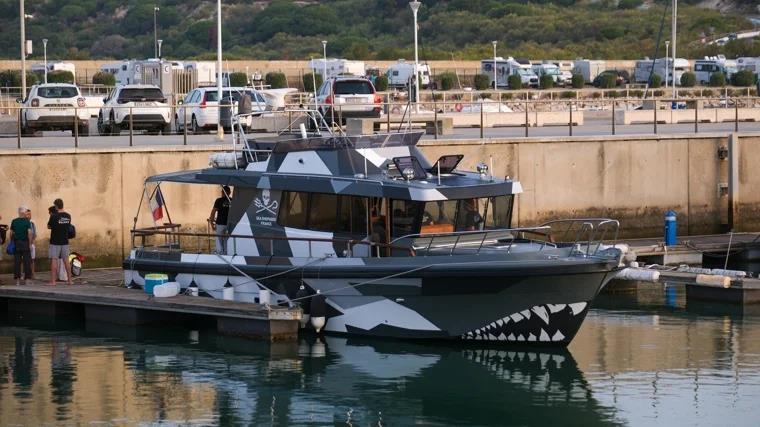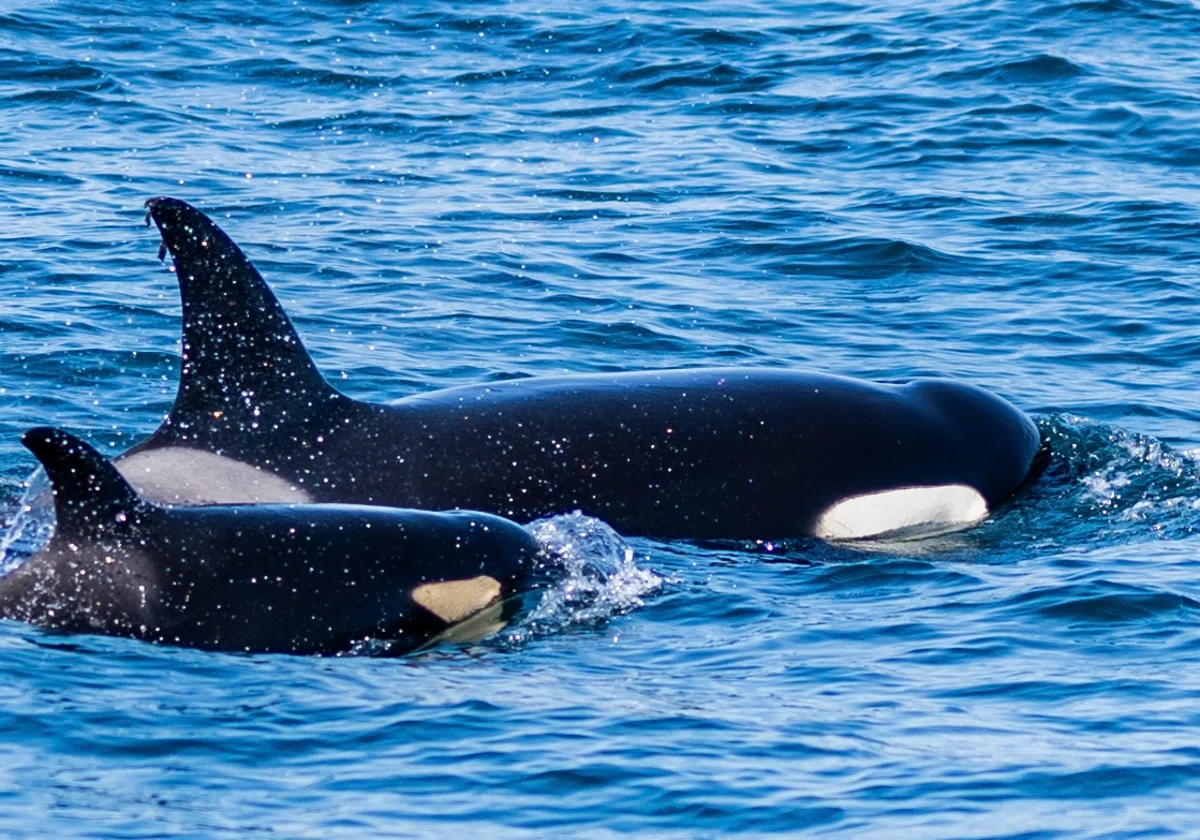Protecting killer whales in the Strait of Gibraltar
The critically endangered Iberian orca faces numerous challenges to its survival, but some humans maintain a watchful eye over these mammals that frequent these waters off the Costa del Sol and Cadiz coast
Macarena García
Barbate
Wednesday, 20 August 2025, 18:35
The Iberian killer whale (or orca) is critically endangered. So says the International Union for Conservation of Nature (IUCN) that lists all endangered animal species. The reasons for this classification lie in the low number of individual orcas, estimated to be between 20 and 35, the high mortality rate of newborns and the state of bluefin tuna numbers, the main food source in the orca diet, which was also endangered until 2019.
Since 2020, Iberian orcas have featured in various news stories. Their interactions with sailboats, even causing some vessels to sink, have filled news and newspaper coverage. Sometimes the word "attack" has even been mentioned, which experts try to avoid as this stigmatises a species already facing enough threats.
The watchers
Sailing boats have joined the list of these threats. In order to avoid interactions, firecrackers are now being thrown into the water from these vessels to keep the orcas away.
This is precisely one of the issues that has led the organisation Sea Shepherd France to launch the Save the Iberian Orca project. With their vessel, the Walrus, docked in the port of Barbate, they travel the waters of the Strait of Gibraltar, following orca movements and giving sailboats that enter their area the necessary recommendations to avoid possible interactions with them.

"It's a game"
Thomas skippers the Walrus and tells us about the project and how it came about: "Save the Iberian Orca started last year because we were aware of the interaction between orcas and sailboats and we knew that there were sailboats doing bad things with firecrackers and other things," he explains. This attitude adds to the multiple threats already faced by orcas, such as "collisions with boats, pollution and noise".
"We frequently see orcas and we can take photos for ID to better understand what's happening with this subpopulation of orcas, why there are so few of them and why they're disappearing. And also maybe to understand why they do that to sailboats, because we don't know why they interact," he says. Of the many theories out there, Thomas is clear that "there's a lot of nonsense". "From what we can see, also when we have scientists on board and we talk to them, it's a game. What the orca does, how it moves, when they blow bubbles and everything, it's a game," he says.
He goes on to explain that "they do similar things, for example, in New Zealand, but not to the point of breaking the boat, the rudder. But they play with the boats and touch them and you see that in other countries with orcas but here, in this area, it's a bit more. And of course it causes damage to the sailboats and it's a problem because, of course, the skippers don't like it, plus it can also be a risk to the crew and all."
For this reason, awareness-raising work is very important for Sea Shepherd France, not only among sailboat captains, but also how the image of the Iberian orca is portrayed in the media: "Since the 2020s, when these interactions started up, what comes out in the media is very dramatic." For example, one such claim in the media is that the orca attacks sailboats as some kind of revenge plot against humans. Since they use the media as a tool for dissemination, they do allow journalists access onto the Walrus in the hope that the right message will get through.
On this point, Thomas adds that: "If the orca wanted to kill people, it would be easy. They're predators, they're animals weighing I dunno how many tons. If they wanted to sink the boat and kill the person, it'd be very easy, they'd do it without any problem and, of course, they don't want to." This supports game theory. "When the rudder breaks, the orca leaves. And the boats that have sunk have done so because a lot of damage was done, the boat took on water and it's also true that these boats are not designed to be very robust in this area," says Thomas.
Shared information
If there is one thing that stands out about this project, it is the willingness to share as much information as possible. For example, with We Whale, the other organisation that patrols the waters of the Strait of Gibraltar: "If we see something, we communicate to say 'we have an orca here', or 'look, there's a sailboat coming here, maybe you can go and talk to them'," As such, talking to the sailboats to keep them safe is also part of the mission of these organisations: "sometimes we know there are orcas in an area and we see a sailboat coming from the Atlantic or Gibraltar. So we talk to them, we go ahead of them and tell them there are orcas in the area. And by doing that, we can avoid interactions."
However, this is not the only thing that is shared. Thomas explains that "all orca ID photos are shared with everyone. If someone wants the photos, we share them without a problem. And we share them with We Whale but also with the Atlantic Orca Working Group, which works on the issue of interactions. And with the University of Cadiz." On this, he clarifies that "We are not scientists, but we are here every day and we see the orcas and so, if we can record information and share it with scientists to help, that's great."
This is a collaboration that they would like to extend. Still, for the time being, "we cannot work with Miteco (Spain's Ministry for Ecological Transition and Demographic Challenge), they don't want to give us permission to do anything with the orca." Thomas provides some specific cases: "This year, at the end of April or beginning of May, we saw an orca in Morocco, north of Cape Spartel, with extensive wounds from a collision with propellers. And another one that was tangled in a fishing net, buoys and drums. We shared that information with everyone here and with Miteco to see if we could do anything to help this orca."
It is already known that Atlas, the injured orca, has recovered very well. But Onyx, who was tangled in netting, has not been sighted again, nor have there been any reports of sightings in Portugal or France. While we await to learn what really happened, the Walrus will continue to patrol the waters of the Strait of Gibraltar, working tirelessly to save Onyx and the other orcas from critical danger of extinction.

Comentar es una ventaja exclusiva para registrados
¿Ya eres registrado?
Inicia sesiónNecesitas ser suscriptor para poder responder.
Necesitas ser suscriptor para poder votar.